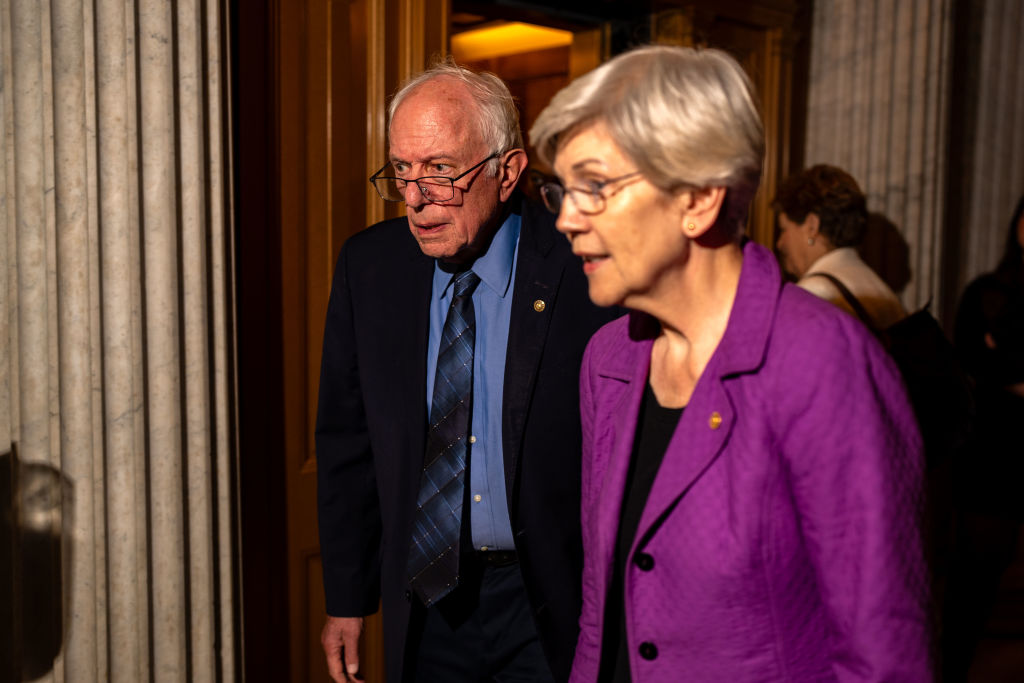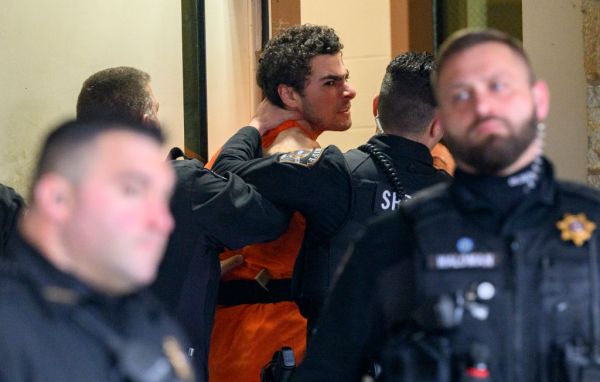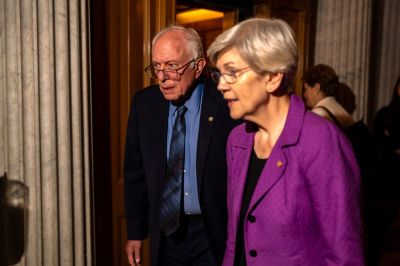When it comes to the killing of Brian Thompson, the chief executive of health insurance giant UnitedHealthcare, some on the left just can’t help themselves.
“What I think has happened in the last few months is that what you have seen rising up is people's anger at a health insurance industry which denies people the health care that they desperately need while they make billions and billions of dollars in profit,” said Sen. Bernie Sanders, the independent from Vermont, on Meet the Press this week.
To be sure, Sanders provided all the caveats about how “outrageous” and “unacceptable” it was that Thompson was shot dead in cold blood earlier this month in New York. But he is not alone among congressional Democrats in connecting the apparent motive of the alleged shooter, 26-year-old Luigi Mangione, to a public-policy debate progressives want to have.
Last week, Massachusetts Sen. Elizabeth Warren said that, while violence is “never the answer,” one can nonetheless “only push people so far and then they start to take matters into their own hands.” (Warren later said she should not have suggested Thompson’s murder was justified.) And on Sunday, Sen. Chris Murphy of Connecticut released a video on social media in which he said that political leaders need to be a part of the “fraught” and “uncomfortable” conversation about health insurance.
“Listen, I’m never going to condone violence. I don’t here,” Murphy said. “What I see happening in this country, though, is a real, visceral anger that the outrage at Brian Thompson’s death or the outrage at the death of any powerful person isn’t matched by the anger over the thousands of people who die often anonymous deaths every single day in this country at the hands of a health-care industry that mostly doesn’t give a shit about people and only cares about profits.”
Thompson’s slaying and the response to it by public officials is the culmination of a disturbing trend of post-facto rationalization of politically coded violence and violent threats. The pattern for those in positions of power is remarkably similar, with practitioners first offering rote condemnation of violence before pivoting to their desired ideological point. The phenomenon is bipartisan—and it has been escalating in recent years.
There was Rep. Paul Gosar, the Arizona Republican, who in 2021 posted on his official Twitter account a parody anime video that depicted a character with his face edited in killing a monster with the face of Democratic Rep. Alexandra Ocasio-Cortez and leaping to attack an image of President Joe Biden. Gosar, who was censured by the House of Representatives over the post, dismissed the argument that the video was a threat, claiming it was merely a “symbolic portrayal of a fight over immigration policy.”
And there was the reaction of some during the campus protests that followed Hamas’ terrorist attack in southern Israel on October 7, 2023. While attending a protest at Columbia University, Democratic Rep. Ilhan Omar of Minnesota responded to antisemitic threats from protesters toward Jewish students with a backhanded condemnation of bigotry against Jews, “whether they are pro-genocide or anti-genocide.” Wink wink, nudge nudge.
Or how about Donald Trump’s comment, when asked about his supporters’ threats to hang Mike Pence at the United States Capitol on January 6, 2021? “Well, the people were very angry,” Trump told the journalist Jonathan Karl. That sentiment was echoed remarkably by Elizabeth Warren’s own statement following Thompson’s killing that “you can only push people so far.”
These sorts of rationalizations have the effect of validating the express motives of violent actors, even when there are reasons to believe that perpetrators are not of sound mind, as may well be the case with Mangione. And politicians seem particularly susceptible to the signals that voters—or, as is nearly always the case, the subset of the most passionate and vocal voters—are sending that the anger over a particular issue is bubbling over into justified violence. What these powerful people fail to see is the signal they are sending right back. For all the throat-clearing that such action is “not the answer” to solving a public policy problem or political debate, using an act of violence to jump-start a policy conversation suggests the exact opposite.
Peter Meijer, the former Republican congressman from Michigan, is familiar with the sort of anger that can boil over into threats of violence or worse. The January 6 riot happened just days into his single term in office, and Meijer was one of the 10 House Republicans to vote to impeach Trump for his role in that day’s events. Trump supporters turned their ire toward the “impeachment 10” but also beyond, flooding the phone lines in Capitol Hill offices and yelling at town-hall meetings even for those Republican members whose only departure from the Trump orthodoxy was not to object to the counting of electoral votes. The threats of violence seem to have affected the decision of at least one of the impeachment 10, Anthony Gonzalez of Ohio, to not run for reelection in 2022.
But when Meijer ran unsuccessfully for the Republican nomination for Michigan’s open Senate seat earlier this year, the once-palpable rage over the “stolen election” and Trump impeachment seems to have subsided, he said. Whether time healed the wounds die-hard Republican voters felt or Trump’s own refocus on his 2024 campaign rather than the post-2020-election fights, the rancor settled down.
“The temperature can’t always stay elevated without additional inputs,” Meijer told The Dispatch. “There’s sort of an entropic leveling of things after a while.”
A heated and charged political environment can drive disturbed people to violence. In recent years, the list is getting disconcertingly longer: the shootings of Reps. Gabby Giffords and Steve Scalise, the attack at the home of Rep. Nancy Pelosi on her husband, Paul, the thwarted assassination attempt of Supreme Court Justice Brett Kavanaugh, and of course the failed assassination of Trump himself earlier this year. In those cases, all but the most fringe elements of political movements denounced the violence without condition.
But it’s those other moments, when public figures with large microphones offer those “additional inputs,” that may lead to more attacks, continue to coarsen the political discourse, and undercut the idea that profound public problems in a liberal society can and should never be solved at the barrel of a gun.







Please note that we at The Dispatch hold ourselves, our work, and our commenters to a higher standard than other places on the internet. We welcome comments that foster genuine debate or discussion—including comments critical of us or our work—but responses that include ad hominem attacks on fellow Dispatch members or are intended to stoke fear and anger may be moderated.
With your membership, you only have the ability to comment on The Morning Dispatch articles. Consider upgrading to join the conversation everywhere.